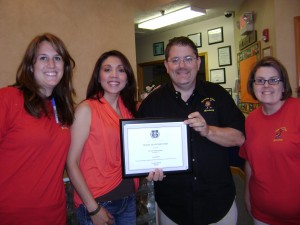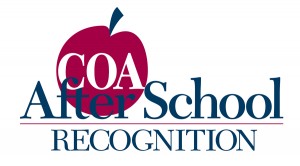 Favorite Time Academy’s After School Program (ASP) is accredited by the Counsel on Accreditation. This is the highest national recognition for quality in After-School and Out-of-School programs. COA accreditation follows that National After School Association standards (NAA) which include practices that lead to stimulating, safe, and supportive programs for young people ages five to fourteen in their out-of-school time. We are proud of our teams commitment to quality and the highest national standards in the industry. Currently we are the only program in the area to achieve COA accreditation.
Favorite Time Academy’s After School Program (ASP) is accredited by the Counsel on Accreditation. This is the highest national recognition for quality in After-School and Out-of-School programs. COA accreditation follows that National After School Association standards (NAA) which include practices that lead to stimulating, safe, and supportive programs for young people ages five to fourteen in their out-of-school time. We are proud of our teams commitment to quality and the highest national standards in the industry. Currently we are the only program in the area to achieve COA accreditation.
About Child and Youth Development Program Accreditation
 COA is the national accreditor of after school programs in the United States and on U.S. military installations worldwide. In addition, COA offers program accreditation for early childhood education programs and youth development (teen) programs.
COA is the national accreditor of after school programs in the United States and on U.S. military installations worldwide. In addition, COA offers program accreditation for early childhood education programs and youth development (teen) programs.
COA has always known that programs serving infants, toddlers, school-age youth and teens are vital to the individuals well-being and development. They also serve as an essential link between the classroom and the home, and as such, provide a unique opportunity to impact the social, emotional, physical, and educational growth of infants, toddlers, children and youth. As such, COA recognizes the importance of strengthening these fields, and nationally accepted standards are an important part of achieving this goal.
COA’s After School specific standards have been recognized in a number of states within tiered-reimbursement systems, as well as Quality Rating (QRS) and Quality Rating Improvement Systems (QRIS). A complete list of these recognitions can be viewed here.
COA’s Contextual Accreditation™ philosophy ensures the standards and process are relevant and beneficial to programs of every size and designation, whether it is preschool, after school, school-age-care, out-of-school-time, 21st Century, extended, day, youth development, etc. COA’s Child & Youth Development Program Accreditation is applicable to a wide array of children and youth programs.
While the process and the CYD Standards have been streamlined to ensure that they are relevant and achievable by programs of different sizes and designations, they adhere to COA’s unwavering commitment to excellence, best practices, client rights, and essential life and safety standards.
Pursuing COA accreditation helps programs transform because the process enables stakeholders—staff, children, youth, families, and the communities in which a program is located—to continuously identify and measure their strengths and opportunities. As a result, a program and its stakeholders will achieve the ultimate goal: the improvement of quality programming. COA Accreditation is not an end—it is a means to an end.
After School Quality Standards
COA’s Standards for After School Programs reflect COA’s philosophy that COA Accreditation is not an end but a means to an end. The real endpoint is a program’s enhanced growth and stability, an unwavering commitment to the health, safety, and rights of children and youth, and measurable and observable results.
To that end, when COA partnered with the National AfterSchool Association (NAA) to transition its accreditation program to COA, we set out to develop a set of standards that are based on generally accepted elements of best practice, outcomes-oriented, effective in advancing quality, and responsive to the unique needs and diversity of after school programs.
COA’s After School Standards represent a merging of NAA’s standards and COA’s standards, and are organized into three separate sections: After School Program Administration (ASP-AM), After School Human Resources (ASP-HR), and After School Programming and Services (ASP-PS). The Program Administration standards cover practices related to continuous quality improvement, financial management, risk prevention and management, and ethical practice. The Human Resources standards address recruitment and selection, training and professional development, support, and supervision. The Programming and Services standards set forth additional recommended practices for working with children and youth in programs occurring during non-school time. Programs implement all three sections of standards. Taken together, these standards represent a set of practices that support quality programming and promote positive outcomes for children and youth.
Each section of standards is organized according to a three-level structure that supports self-assessment and standards implementation. At the highest level, a purpose standard provides the overall aim of the section of standards. At a middle level, each section is comprised of several sub-sections that are headed by core concept standards. Core concept standards describe program components that support the purpose standard. Lastly, at a third level, standards contain detailed practices that contribute to the core concept, and to meeting the purpose. These are practice standards.
COA’s standards are grounded in a long-standing, widely held belief that children, youth, and families benefit when a program enhances its capacity to achieve its mission and validate its impact. COA also embraces the idea that the positive effects of implementing national standards multiply when programs become part of a community that shares and supports this perspective. We hope you will consult and implement the standards to that end.




